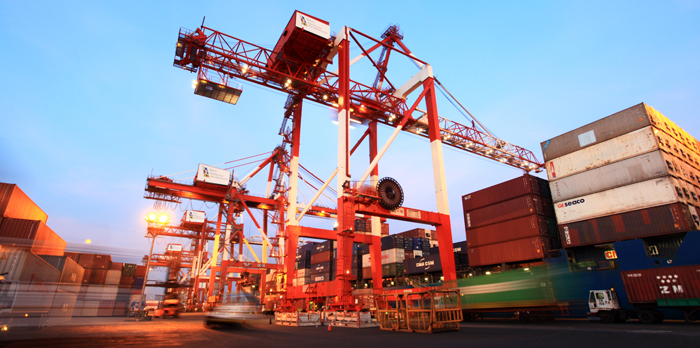
The Bureau of Customs (BOC) Port of Manila (POM) is putting in place measures to free up more space at Manila South Harbor to address growing volumes and prepare for the influx of shipments for the upcoming holidays.
BOC-POM has crafted a memorandum on proposed guidelines for the transfer of overstaying cargoes from Manila South Harbor to an inland container depot (ICD) owned by port operator Asian Terminals Inc. (ATI) in Laguna, BOC POM district collector Atty. Erastus Sandino Austria told PortCalls in a recent interview.
The proposed guidelines, which are being discussed with Manila South Harbor operator ATI, aim to “address the high utilization, projected influx of importation and to create more space to expedite the processing of alerted shipments at the South Harbor,” Austria said.
He noted that the proposal seeks to provide more space for import laden containers in Manila South Harbor, instead of having overstaying cargoes use the slots.
“We don’t want a repeat of the 2014 port congestion,” Austria said, though he noted that other factors outside the jurisdiction of BOC may trigger congestion.
Once the guidelines are approved and implemented, Austria said an initial 900 slots currently occupied by overstaying containers at Manila South Harbor will be freed.
Under the draft guidelines, the transfer will cover containers subject for condemnation; those that remain unsold through public auction and negotiated sale; those that are the subject of negotiated sale; and those overstaying for more than one year.
Austria noted that under the proposed guidelines, ATI will bear the cost of transferring the overstaying containers, and will be liable for damage, loss, or pilferage of the containers.
The proposed guidelines, which also include operational procedures and other conditions, were drafted in consultation with BOC’s Law Division and Legal Service, Austria noted.
The POM district collector hopes the proposal will be approved soon so results can be seen after a month’s time.
Another measure to provide more space for laden containers in the terminal is to limit the space for empty containers at South Harbor, Austria said in a speech during the Philippine Multimodal Transport and Logistics Association, Inc. general membership meeting on September 6.
Changing reckoning period
Austria also said that a draft customs memorandum order (CAO), which has been submitted to the Department of Finance for approval, changes the reckoning period for the allowed stay of a container in the country.
He said the draft CAO, which implements certain provisions of the Customs Modernization and Tariff Act (CMTA), orders that a container be re-exported after 90 days, with the count starting from the date of discharge of the last container from the vessel. This is against the current practice of basing the 90-day dwell time from the date in the equipment interchange receipt (EIR).
Austria explained that shipping lines–owners of the containers—are generally compliant with the 90-day period if the reckoning is based on the EIR. But in reality, the container’s dwell time is longer than 90 days if the period from the discharge of the last container from the vessel to the issuance of the EIR is also taken into account.
Under the law, if a foreign container exceeds the 90-day dwell time, it will be considered an importation and levied duties and taxes.
Austria said the change in the reckoning period aims to prevent overstaying of empty containers inside the terminal or elsewhere in the country.
Stakeholders have been raising the issue of difficulty in returning empty containers to container yards, as most yards in Metro Manila are already full or at high capacity.
Unfair proposal, say carriers
Association of International Shipping Lines general manager Atty. Maximino Cruz earlier said the proposal to change the reckoning period for counting the 90-day period dwell time to the date of discharge of the last container from the vessel instead of the date in the EIR “is unfair and disadvantageous for shipping lines as they do not yet have full control of their containers.”
He explained that this could create problems especially when loaded containers are put on alert or seized by BOC before they can be released from the port.
“While the matter is between the importer and BOC, the container, which is a shipping line’s equipment, is being held hostage as is being done today,” Cruz added.
He said AISL recommends maintaining the current rule of counting the 90-day dwell time from the return of the empty container to the shipping line’s nominated depot, as indicated in the EIR.
“It is only when the empty container is returned to the empty container depot that shipping lines regain full control of their container,” he pointed out.
The proposed change in the reckoning period for the dwell time of containers is included in a draft CAO that has been submitted to the Department of Finance for approval. – Roumina Pablo





